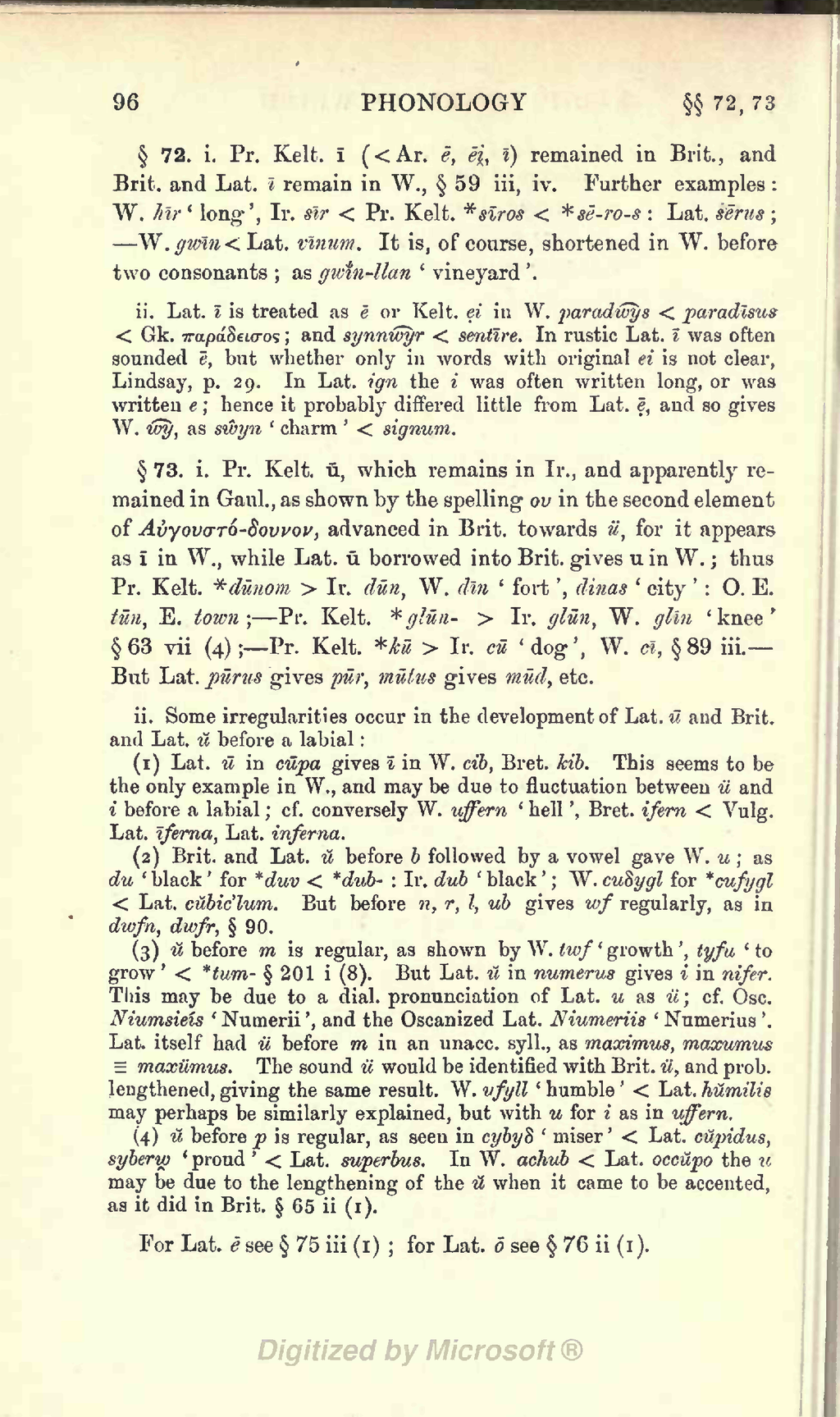§ 72. i. Pr. Kelt. ī (< Ar. ē, ēi̯, ī) remained in Brit., and Brit. and Lat. ī remain in W., § 59 iii, iv. Further examples: W. hīr ‘long’, Ir. sīr < Pr. Kelt. *sīros < *sē-ro‑s: Lat. sērus;—W. gwīn < Lat. vīnum. It is, of course, shortened in W. before two consonants; as gwĭ́n-llan ‘vineyard’.
ii. Lat. ī is treated as ē or Kelt. ẹi in W. paradw͡ys < paradīsus < Gk. παράδεισος; and synnw͡yr < sentīre. In rustic Lat. ī was often sounded ē, but whether only in words with original ei is not clear, Lindsay, p. 29. In Lat. ign the i was often written long, or was written e; hence it probably differed little from Lat. ẹ̄, and so gives W. w͡y, as sŵyn ‘charm’ < signum.
§ 73. i. Pr. Kelt. ū, which remains in Ir., and apparently remained in Gaul., as shown by the spelling ου in the second element of Αὐγουστό-δουνον, advanced in Brit. towards ü, for it appears as ī in W., while Lat. ū borrowed into Brit. gives u in W.; thus Pr. Kelt. *dūnom > Ir. dūn, W. dīn ‘fort’, dinas ‘city’: O. E. tūn, E. town;—Pr. Kelt. *glūn- > Ir. glūn, W. glīn ‘knee’ § 63 vii (4);—Pr. Kelt. *kū > Ir. cū ‘dog’, W. cī, § 89 iii.—But Lat. pūrus gives pūr, mūtus gives mūd, etc.
ii. Some irregularities occur in the development of Lat. ū and Brit. and Lat. ŭ before a labial:
(1) Lat. ū in cūpa gives ī in W. cib, Bret. kib. This seems to be the only example in W., and may be due to fluctuation between ü and i before a labial; cf. conversely W. uffern ‘hell’, Bret. ifern < Vulg. Lat. īferna, Lat. inferna.
(2) Brit. and Lat. ŭ before b followed by a vowel gave W. u; as du ‘black’ for *duv < *dub‑: Ir. dub ‘black’; W. cuẟygl for *cufygl < Lat. cŭbic’lum. But before n, r, l, ub gives wf regularly, as in dwfn, dwfr, § 90.
(3) ŭ before m is regular, as shown by W. twf ‘growth’, tỿfu ‘to grow’ < *tum- § 201 i (8). But Lat. ŭ in numerus gives i in nifer. This may be due to a dial. pronunciation of Lat. u as ü; cf. Osc. Niumsieís ‘Numerii’, and the Oscanized Lat. Niumeriis ‘Numerius’. Lat. itself had ü before m in an unacc. syll., as maximus, maxumus ≡ maxümus. The sound ü would be identified with Brit. ü, and prob. lengthened, giving the same result. W. ufyll ‘humble’ < Lat. hŭmilis may perhaps be similarly explained, but with u for i as in uffern.
(4) ŭ before p is regular, as seen in cybyẟ ‘miser’ < Lat. cŭpidus, syberw̯ ‘proud’ < Lat. superbus. In W. achub < Lat. occŭpo the u may be due to the lengthening of the ŭ when it came to be accented, as it did in Brit. § 65 ii (1).
For Lat. ē see § 75 iii (1); for Lat. ō see § 76 ii (1).
